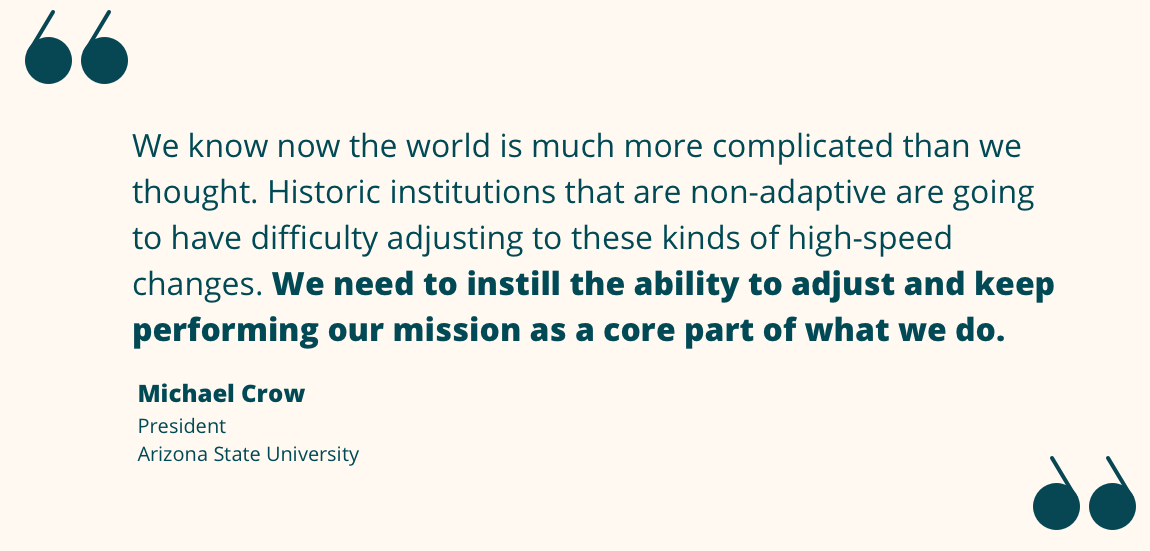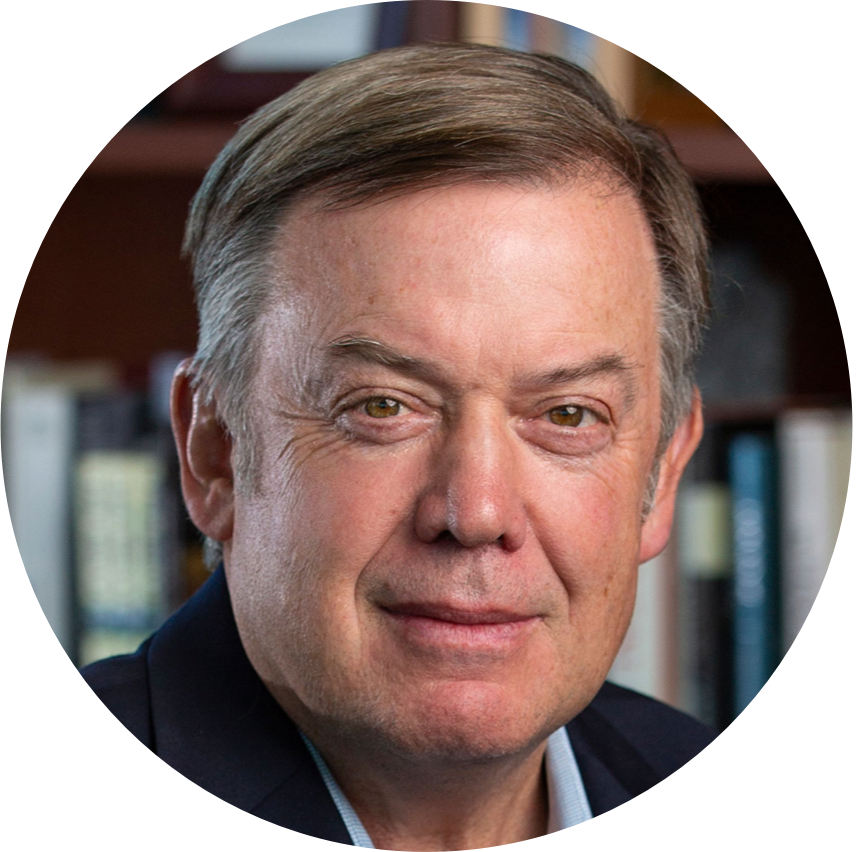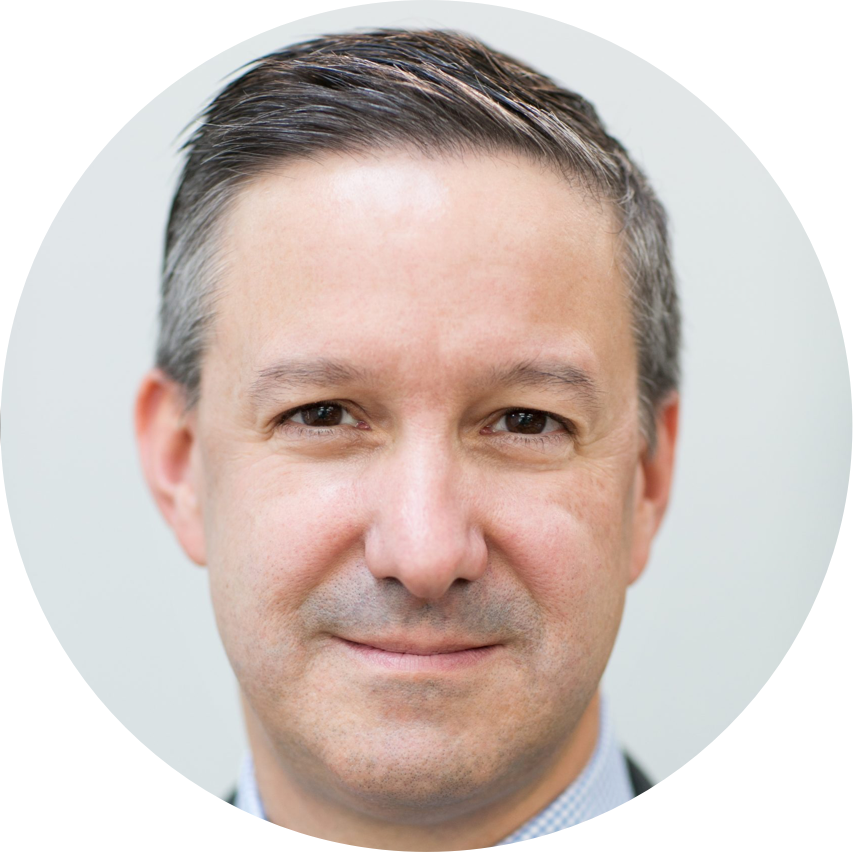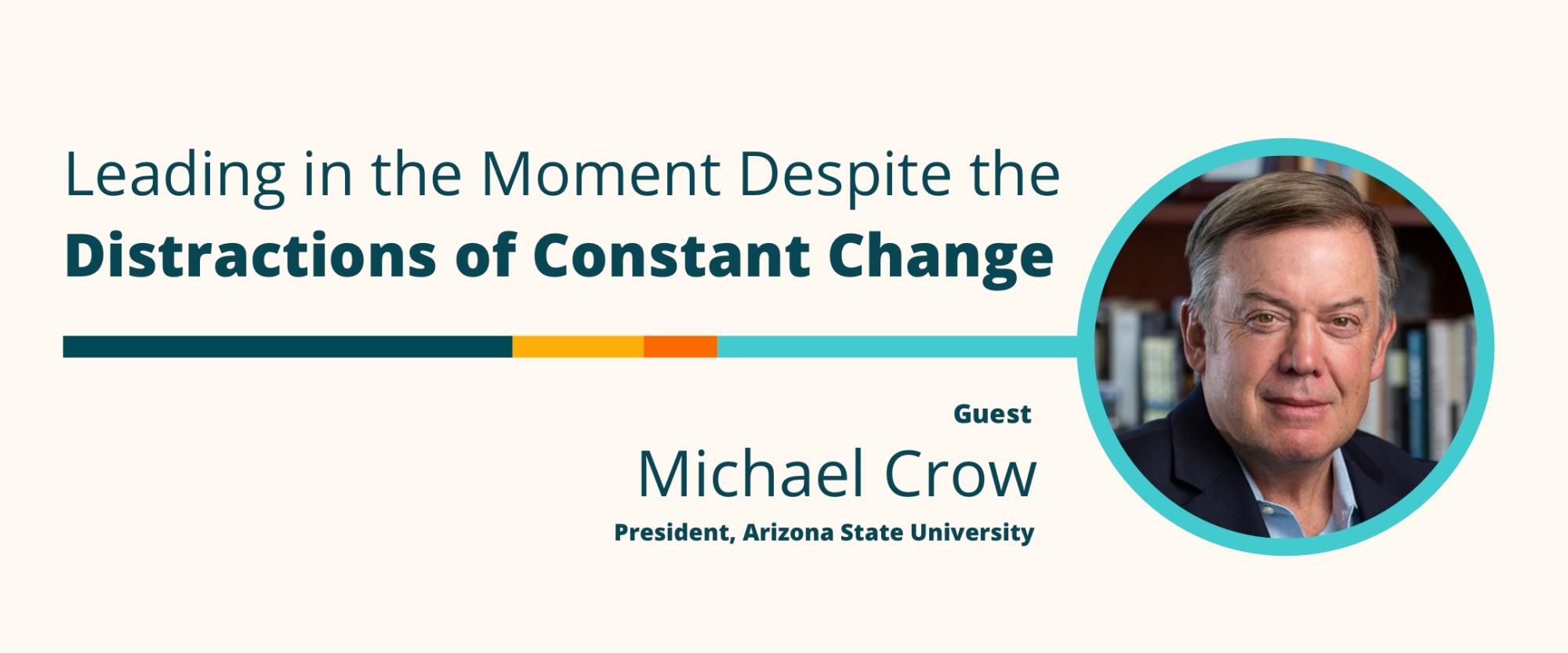Note: This interview originally aired on April 13, 2020 as part of the University Innovation Alliance’s Weekly Wisdom Series that airs live on Facebook, Twitter, and LinkedIn.
As Executive Director of University Innovation Alliance, I'm happy to be part of the Weekly Wisdom podcast series with my co-host Jeff Selingo, author, journalist, and special advisor at Arizona State University. For our first Weekly Wisdom conversation, created in partnership with Inside Higher Education and originally aired on April 13, 2020, we were excited to speak with Michael Crow, President of Arizona State University. We've both known President Crow for a long time; Jeff, in particular, first met him more than a decade ago as a writer and editor at the Chronicle of Higher Ed. Jeff made an observation that the college presidents best positioned for the challenges of 2020 are the ones who’ve served their institution long enough to understand the gravity of this moment and how to respond to it. Having led ASU for 18 years, Michael Crow had a lot of wisdom to share.
Advice for Other Presidents in This Moment
President Crow told us that he and the ASU team have never worked harder to deliver all of the services and educational opportunities their students expect. They’re increasing the speed at which they innovate, advancing new ideas, and constantly adjusting to everything they encounter in this uncertain time. Despite this significant increase in work and pace, he stated, “It's been the most invigorating time I think I've had in a long time.”
An Analogy Higher Education Leaders for the Time of COVID-19
President Crow shared this sailing analogy: Everyone in academia is at sea and accustomed to steady, stable wave conditions. But now we're experiencing 30- to 40-foot waves on a regular basis, such as the pandemic, financial issues, cultural issues, and organizational issues. To maintain basic seaworthiness and prepare for the large, potentially damaging waves ahead, President Crow talked about the need to “prepare yourself to move forward irregardless, to adjust and to adapt, to trim, to change, to alter your course a little bit, to make certain kinds of adjustments, and then to prepare." He further emphasized that if academia continues to operate as they’ve always done before, they won’t be positioned to adjust, adapt, and prepare for present conditions or future waves.
The Leadership and Framework We Need Right Now
A framework can help us meet uncertain times proactively. It lets us identify how to better prepare for what lies ahead. President Crow suggested that we “introduce some more changes, cooperate with others, partner with others, lead with others, engage in helping higher education overall to be successful. We need to broaden our thinking of education itself and not leave K-12 behind, or out, or disconnected.”
He also added that, as a major public research university, ASU asks themselves: “What do we have that can be good for the general order – all assets, all things, all tools?" For example, he described how they made their library significantly more available to the public. The key is an attitude of transformation, “not to maintain some notion that you're going to just batten down the hatches of your ship and weather the storm, but you've got to find ways to connect, link, and modify what you're doing along the way.”
Leading in the Moment Despite the Distractions of Constant Change
The key, President Crow says, is that “the outcome is where our duty lies.” This means a focus on maintaining an environment where learners can learn and advance successfully. Operationally, ASU continually adjusts to the realities of the COVID pandemic by advancing all of their assets in ways to match the current conditions.
Revisiting his sea analogy, President Crow emphasized that you can't worry about where the waves are coming from or “about trying to control all these factors or control all these variables.” University leaders have a responsibility to deliver education, which is essential to America's short-, mid-, and long-term success. He stated, “We have to then take the mindset we can't falter.”
He expressed his concern for leaders who may not fully understand that the current uncertainty could go on for some time, or their need to be prepared for operating in whatever mode they can for as long as necessary. He said that ASU regularly reviews contingency plans across the entire spectrum of operational environments with these questions: “Could we operate in this distributed fashion for a year? Could we do that for longer? Could we operate in different ways of thinking about what's the nature of education? Could we work more significantly with employers and companies and corporations to change the way that adults and ongoing education continue?” This is how he adjusts to the variables and controls the outcome.
As an example, President Crow mentioned that ASU is deploying its telehealth and telemedicine services to take care of 75,000 students who are typically on campus, with a few thousand still living in residence halls. He said, “The key is, from a mindset perspective, is to just focus on your responsibility and the delivery of your core service.”
Adjusting Plans to Realities
Dwight Eisenhower said, “Planning is necessary and unbelievably important and completely worthless once the battle begins.” And President Crow reflected that this year's ongoing cycle of planning and adjusting has intensified elements of ASU's vision, making it a different and better institution than it was four weeks ago, with more capabilities than they've ever had. For example, they realized that ASU Sync (their Zoom-based, two-dimensional, face-to-face, digital immersion platform) wasn't suited for all teaching modalities, so they've begun acquiring the technology to operate in virtual and augmented reality, which will add another dimension to implementing their vision.
“It's an error to sit back and say that we're just going to weather the storm and then re-launch the vision,” President Crow warned. “We know now the world is much more complicated than we thought. The globalization of the planet to eight billion people in highly urbanized settings is creating all kinds of complexities. Historic institutions that are non-adaptive are going to have difficulty adjusting to these kinds of high-speed changes. We need to instill the ability to adjust and keep performing our mission as a core part of what we do.”

With these adjustments come the discovery that universities and colleges can now offer great value to many more people. President Crow and his team didn’t initially realize how well their ASU Sync platform could work, but now they’re offering 14,000 Zoom sessions within two days. “This is the way we’re going to work," he reflected, "so we won’t fall back into the way things were, because how could we?”
Sources of Inspiration
Beyond the courage, adaptability, and ingenuity of the people on the front lines that are treating those with the virus, President Crow said that he also draws inspiration from his faculty, students, and staff. The speed and the level of caring by his staff have been heartening, along with the overall inspiration of seeing people adjust everywhere. For example, a group of ASU students built the PPE Response Network, a distributed COVID PPE manufacturing system using 3D printers.
"There's a deep inspiration, almost moral inspiration," he explained. "That we care enough about other people to take on this virus so that we can get through this the best we can, that indicates where we have got as a society, both within the U.S. and globally. It means that we've really evolved immensely, and that's very inspiring to me."
In addition to watching Jack Black movies to laugh with his family, President Crow admitted to reading many books simultaneously. He recently finished The British Are Coming, which “tells you what the actual cost of the American Revolution was, not the idealized, ideological outcome, but the cost in human blood and sacrifice and financial disruption.” It made him realize that he lives in a country that's a product of their heroic efforts. His admiration of scientists working 24/7 on the front lines to meet our society's challenges prompted him to read a biography of Jonas Salk. President Crow added, “You look at people like Louis Pasteur and other scientists that were able to step through time. We're gonna have that again, and those things are gonna happen, and so all that stuff is very inspiring to me.”
Links Mentioned in This Episode
• Inside Higher Education
• Chronicle of Higher Education
• ASU Sync
• PPE Response Network
• The British Are Coming
• Jonas Salk
• Michael Crow
• Bridget Burns
• Jeff Selingo
• Who Gets In & Why: A Year Inside College Admissions
• FutureU
• Podcast episode
Bios of Guest and Co-Hosts

Guest: Michael Crow, President, Arizona State University
Michael Crow became the 16th president of Arizona State University on July 1, 2002. Under his direction, the university pursues teaching, research, and creative excellence focused on the major challenges and questions of our time, as well as those central to the building of a sustainable environment and economy for Arizona. He has committed the university to global engagement and to setting a new standard for public service. Milestones during his tenure have included the establishment of research initiatives such as the Biodesign Institute, the Global Institute of Sustainability, and the Center for the Study of Religion and Conflict; the establishment of more than a dozen new interdisciplinary schools; an unprecedented research infrastructure expansion; a dramatic increase in research awards; and the announcement of the eight largest gifts in the history of the university. Prior to joining ASU, President Crow was executive vice provost of Columbia University, overseeing Columbia’s research enterprise and technology transfer operations. A fellow of the National Academy of Public Administration and member of the Council on Foreign Relations, he is the author of books and articles relating to the analysis of research organizations and science and technology policy.

Co-Host: Bridget Burns, Executive Director, University Innovation Alliance
Dr. Bridget Burns is the founding Executive Director of the University Innovation Alliance (UIA). For the past decade, she has advised university presidents, system chancellors, and state and federal policy leaders on strategies to expand access to higher education, address costs, and promote completion for students of all backgrounds. The UIA was developed during Bridget’s tenure as an American Council on Education (ACE) Fellowship at Arizona State University. She held multiple roles within the Oregon University System, including serving as Chief of Staff and Senior Policy Advisor, where she won the national award for innovation in higher education government relations. She was a National Associate for the National Center for Public Policy and Higher Education, and has served on several statewide governing boards including ones governing higher education institutions, financial aid policy, and policy areas impacting children and families.

Co-Host: Jeff Selingo, author, journalist, special advisor at Arizona State University
Jeff Selingo is an author, a journalist, and a special advisor at Arizona State University. He has written about higher education for more than two decades and is a New York Times bestselling author of three books. His latest book, Who Gets In & Why: A Year Inside College Admissions, was published in September 2020 and was named an Editors’ Choice by the New York Times Book Review. A regular contributor to The Atlantic, Jeff is a special advisor for innovation and professor of practice at Arizona State University. He also co-hosts the podcast, FutureU. He lives in Washington, DC with his family.
About Weekly Wisdom
Weekly Wisdom is an event series that happens live on Facebook, Twitter, and LinkedIn. It also becomes a podcast episode. Every week, we join forces with Inside Higher Ed and talk with a sitting college president or chancellor about how they're specifically navigating the challenges of this moment. These conversations will be filled with practicable things you can do right now by unpacking how and why college leaders are making decisions within higher education. Hopefully, these episodes will also leave you with a sense of optimism and a bit of inspiration.
Rate, Review & Subscribe
Learn why hundreds of people have rated this new podcast 5 stars! Please join others and rate and review this podcast. This helps us reach and inform more people -- like you -- to help increase the number and diversity of college graduates in the United States.
Click here, scroll to the bottom, tap to rate with five stars, and select “Write a Review.” Then be sure to let us know what you loved most about the episode! Also, if you haven’t done so already, subscribe to the podcast. We’ll be adding a bunch of bonus episodes to the feed and, if you’re not subscribed, there’s a good chance you’ll miss out.

